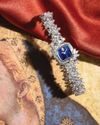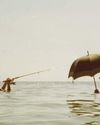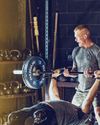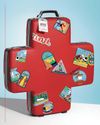CATEGORIES
Kategoriler
Son Hikayeler

GO AHEAD. ORDER THE MEAT LOAF.
Sure, the burger might be the safer bet. But when you learn to weigh the benefits of new options versus familiar standbys, the big decisions (about work, about life, about diner food) become a whole lot easier.

MY DILL-IANT FRIEND
How two men, three decades apart in age, found fitness and healing in pickleball—and in their friendship.

WHAT THE MAHA PSYCHEDELIC PUSH MEANS FOR YOUR MIND
Plant-based, mind-altering drugs are taking center stage in public health debates. Our go-to psychiatrist breaks down what's real about the new momentum behind psychedelics for mental health.

THE SECRET BEHIND SUPERSHOE SPEED
ONE WEEK BEFORE the 2018 New York City Marathon, Olympian Jared Ward received a package from Saucony, his shoe sponsor. Inside were three early prototypes of what eventually became Saucony's first super shoe, the Endorphin Pro 1.

What's Luck Got to Do with It?
Longevity in Hollywood can be elusive unless you're Angela Bassett. With a smart new series that puts her in the Oval Office and a summer blockbuster on the horizon, she delivers a master class in both elegance and endurance.

The Idol of Restraint
Jewelry designed by Tina Chow rarely comes up for auction-because no one wants to part with it. Her legacy, however, can be spotted more often. If you know where to look.

The Cult of BACK PAIN
Membership in this highly undesirable club comes with its own lingo, syllabus, and gurus and now its very own antihero.

No Shrinking VIOLET
For a certain woman, this iconic scent has become as much an everyday wardrobe staple as her Cartier Tank and her Hermès scarf.

5 MYTHS ABOUT FRUIT
Even the earth's most nutritious treats have been battered and bruised by Internet misinformation. Take a bite of these juicy truths.

SPRING-CLEAN YOUR HABITS
CHECK OFF THE ONES YOU WANT TO ADD TO YOUR DAILY ROUTINE.

STRENGTH AND SPEED TRAINING FOR YOUR BRAIN
Welcome to the booming world of high-performance mental training, where tech tools offer amateur athletes (like you!) a chance at pro-level focus, calm, and control.

Go Back to Basics
So you've reached the top of the heap and don't know where to go next. How about back to where it all began?

In Living COLOR
There is still much to be learned from the old masters.

BANGKOK and BEYOND
The new setting for White Lotus, THAILAND has much to OFFER BEYOND beaches and backpackers

THE UNSHAKABLE CONFIDENCE OF ZOE KRAVITZ
With her directorial debut under her belt and more great roles on the horizon, Kravitz is more sure of herself than ever.

LET'S STOP GLORIFYING GRIT
I SAW A post floating around social media that made me roll my eyes: \"The person who chooses to run outside in the winter over a treadmill is a powerful person.\"

THE INCANDESCENT RISE OF SOFIA CAMACHO
THE WILDLY TALENTED NONBINARY DRAG ARTIST AND RUNNER IS AIMING FOR A PLACE ON THE SPORT'S MOST VISIBLE STAGE

The Un-Tortured Artist
Robert Rauschenberg's compound on Captiva will once again serve as muse.

Be the Change
Mikhail Baryshnikov could have dined out for a lifetime on his talent and fame. What good would that have done?

The Vagina Dialogue
Doctors and patients are discussing the benefits of therapy for the pelvic floor as a solution to intimate issues like painful sex, incontinence, and more. Here's what you need to know.

"THE MOST IMPORTANT PART OF RECOVERY IS EFFORT AND WE TRAIN THAT."
In a community ravaged by the opioid crisis, the PORTSMOUTH SPARTAN KETTLEBELL CLUB builds a different form of strength.

The Age of Accessories
From bejeweled bags to crayon-hued tights, accessories weren't just extras: They were the stars of this season.

WHY IS EVERYONE TALKING ABOUT METABOLIC HEALTH
Scientists have harped on the perks of a STRONG METABOLISM for decades. Now, a new source of ENERGY is joining them: INFLUENCERS, PODCASTERS, AND BIOHACKERS.

Anatomy of a Classic
A game changer returns to audaciously shake things up again.

This Old Thing? T&C Reviews: Breton Stripes
If the sea represents the collective unconscious, the marinière says a lot about us.

Tariff PANIC!
The threat of higher import duties on luxury goods has alarmed the fashion world. Is shopping in Europe about to get more expensive, or is all this pearl clutching over nothing?

GOING GRAY? NOT SO FAST.
Cutting-edge tech might reverse how your hair looks as you age. Really.

HOW TOXIC POSITIVITY AGGRAVATED ONE OF MY WORST EXPERIENCES
RECENTLY, I SUCKED. As soon as I started to run the 2024 New Balance 5th Avenue Mile in New York City, I lost my breath.

DOCTORS BLAMED MY SYMPTOMS ON RUNNING.THEY WERE WRONG.
RUNNING AND MENSTRUATION entered my life around the same time, at age 13.

THE BRAVE NEW WORLD OF MIDDLE-AGE MEDICAL TOURISM
NEW TEETH, NEW HAIR, NEW KNEE, NEW OUTLOOK ON LIFE.
